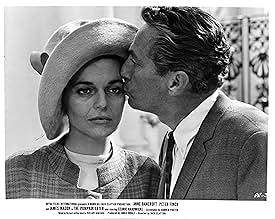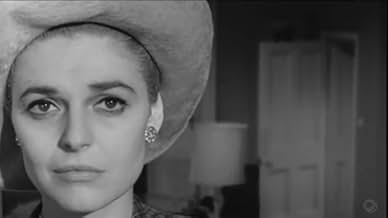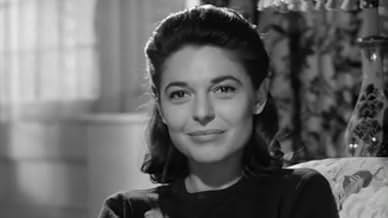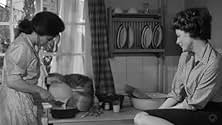IMDb RATING
7.1/10
3.2K
YOUR RATING
Beautiful mother of five Jo leaves the banality of her marriage to second husband Giles to wed her passionate screenwriter lover, Jake Armitage. As her suspicion of Jake's philandering grows... Read allBeautiful mother of five Jo leaves the banality of her marriage to second husband Giles to wed her passionate screenwriter lover, Jake Armitage. As her suspicion of Jake's philandering grows, Jo's sanity spirals.Beautiful mother of five Jo leaves the banality of her marriage to second husband Giles to wed her passionate screenwriter lover, Jake Armitage. As her suspicion of Jake's philandering grows, Jo's sanity spirals.
- Nominated for 1 Oscar
- 6 wins & 6 nominations total
Lesley Nunnerley
- Waitress at Zoo
- (as Leslie Nunnerley)
- Director
- Writers
- All cast & crew
- Production, box office & more at IMDbPro
Featured reviews
I came upon this movie on late night t.v. a few years back. I really love Anne Bancroft and I think that she is, not underrated, but more correctly, overlooked as a great actress. This film is a wonderful study of a marriage in trouble and Ms. Bancroft and the great Peter Finch are so believable as lovers and as a married couple that I wondered why I had never even heard of the film before. I felt their pain - wait, sorry . . . I think someone else named Clinton coined that phrase. But seriously, Anne Bancroft is able to really convey heartbreaking loneliness that you just want to cry or help her in some way. I love movies that engage you thoroughly. If you enjoy movies that make you think and also have a viewpoint about human relations, please try to find this film. An added bonus is a wonderful appearance in a small role by Maggie Smith - certainly a very early one in her career. I really like finding gems like this!
This is my absolute favorite film of all time, and Anne Bancroft's performance is her best. Made in 1964 and set in London, this film tells the story of a woman who is in the middle of her third marriage, to a screenwriter, played by Peter Finch. Her character, Jo Armitage, is a woman who truly seems to find her self-worth and happiness only when she is pregnant and raising children. Once her children become even only slightly older, she seems to lose her sense of purpose, and allows herself to become quite isolated in the world. Her current husband, the screenwriter, doesn't make matters any better for her either.
This is definitely Anne Bancroft's film all the way, and she is breathtakingly beautiful in it as well. Her portrayal of Jo Armitage paints a very lonely, depressed, lost, and in many ways pathetic character...but it is also strangely my favorite performance of Bancroft. Look also for wonderful supporting performances by James Mason and Maggie Smith. This film weaves a disturbing yet very realistic portrait of a bad marriage (some might just say "marriage"), and it should be studied for its acting and its writing. In addition, Georges Delerue's musical score is superb, and I am always searching for the film's soundtrack, but have had no luck. Thanks to beautiful art direction by Edward Marshall, their home interior is also gorgeous...'60's chic. I've seen this film at least 60 times, and never tire of it. It's a quiet little masterpiece.
This is definitely Anne Bancroft's film all the way, and she is breathtakingly beautiful in it as well. Her portrayal of Jo Armitage paints a very lonely, depressed, lost, and in many ways pathetic character...but it is also strangely my favorite performance of Bancroft. Look also for wonderful supporting performances by James Mason and Maggie Smith. This film weaves a disturbing yet very realistic portrait of a bad marriage (some might just say "marriage"), and it should be studied for its acting and its writing. In addition, Georges Delerue's musical score is superb, and I am always searching for the film's soundtrack, but have had no luck. Thanks to beautiful art direction by Edward Marshall, their home interior is also gorgeous...'60's chic. I've seen this film at least 60 times, and never tire of it. It's a quiet little masterpiece.
Jo Armitage (Anne Bancroft) seems to be losing it while her husband Jake (Peter Finch) is unable or unwilling to help. In flashbacks, Jake is shown to be her third husband after having several children. She continues to have children with Jake. Jake sends Jo to a psychiatrist. He suggests that Jo wants to sanctifies sex by reproducing. While Jake is a good provider, she suspects him of improprieties. After getting pregnant, the psychiatrist and Jake suggest getting an abortion and sterilization. After the operation, things are going great and then Bob Conway (James Mason) brings evidence that Jake is cheating with his wife.
The title refers to the nursery rhyme Peter Peter Pumpkin Eater. Jo is a perplexing character. She is struggling but she is not crazy. It is an interesting character but I am of two minds about it. It allows Bancroft to do some good acting but it is also hard to fully invest in her. There is an attempt at surrealism with the cigarette smoke going backwards. Maybe more of that surrealism would allow the audience to feel her troubled mind.
The title refers to the nursery rhyme Peter Peter Pumpkin Eater. Jo is a perplexing character. She is struggling but she is not crazy. It is an interesting character but I am of two minds about it. It allows Bancroft to do some good acting but it is also hard to fully invest in her. There is an attempt at surrealism with the cigarette smoke going backwards. Maybe more of that surrealism would allow the audience to feel her troubled mind.
Great movies remain great movies some of them, like "The Pumpkin Eater" acquire an extra something with the passing of time. Harold Pinter does really extravagant things with Penelope Mortimer's novel and the extraordinary Jack Clayton gives it just the right mixture of human drama and sharp satire. Anne Bancroft is indescribable moving, beautiful, powerful, frightening. Peter Finch is also superb as is James Mason. I particularly enjoyed the brief moments with Yootha Joyce, Maggie Smith and Cederic Hardwicke. I advise all movie lovers in the Los Angeles area to check the American Cinematheque listings. I saw "The Pumpkin Eater" there, a beautifully restored print and reminded me when one went to the movies to see adult themes treated by intelligent adult artist with enormous regard for their audiences. Oh, those were the days.
I've never seen a film with so many great talents giving technically good performances with a script that offers virtually no insight into the characters or their motivations.
Did you know
- TriviaThis movie never explains its title, which refers to a traditional children's rhyme: "Peter, Peter, pumpkin eater/Had a wife, but couldn't keep her/So he put her in a shell/And there he kept her very well." This serves as the epigraph of Penelope Mortimer's original novel.
- GoofsIn the shot after Jake pours out his drink on Conway, the film is being run backwards for some reason, as the smoke from the cigarette clearly indicates.
- Quotes
[last lines]
Jo Armitage: Yes. I'll have one.
- ConnectionsFeatured in James Mason: The Star They Loved to Hate (1984)
- How long is The Pumpkin Eater?Powered by Alexa
Details
- Release date
- Country of origin
- Language
- Also known as
- The Pumpkin Eater
- Filming locations
- Turville, Buckinghamshire, England, UK(Cobstone Windmill - the Armitage's country house with views of town below)
- Production company
- See more company credits at IMDbPro
- Runtime
- 1h 58m(118 min)
- Color
- Aspect ratio
- 1.85 : 1
Contribute to this page
Suggest an edit or add missing content






































